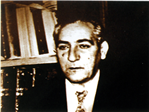
Hassan Sadr
Hassan Sadr was born in 1907 in Isfahan and died in 1985 in Milwaukee, Wisconsin. His older brother, Hossein, was a scholar of theology and an active opponent of the regime. Inspired by him, Hassan pursued higher education and received his law degree from Tehran University in 1933. Upon completing his mandatory military service, he joined the Ministry of Justice as a young prosecutor. He left his government job and began a private law practice in Tehran. Shortly afterwards he founded Qiyam-e Iran, a left-leaning newspaper that frequently landed him in jail, including eight months in detention following the attempted assassination of the Shah in 1949. On the political scene, Qiyam-e Iran continued to strongly support both Mossadegh and, as a founding member, the National Front.
As a recognized lawyer, public speaker, and journalist, Sadr was Mossadegh’s choice for preparing Iran’s legal response to the British government’s complaint to the World Court regarding Iran’s nationalization of its oil industry. After the 1953 coup, once again, Hassan Sadr affirmed his commitment to his political beliefs by representing Dr. Mossadegh as his defense lawyer. He remained faithful to him until his death in 1985.
Hassan Sadr wrote several books. The first, Hoghough-e zan dar Islam va Oroopa, was an academic comparative study of women’s rights in Islam and Europe. It was published in 1941 and translated into English in 2013. His second book, Mard-e naamoutanaahi Ali ibn Abi Talib alayh al-salam, was a refreshing biography of Ali, the “perfect man.” Published in 1957, the book demonstrated a deep appreciation of early Shiism. In 1958 it was awarded the Publishers Association of Iran’s prize, a cash award that he donated for the construction of an elementary school. His third book, al-Jazaayir va mardaan-e moujaahid [Algeria and the mujahideen], published in 1963, was intended to show that the struggle for North African independence was a continuation of the fight to end colonialism.